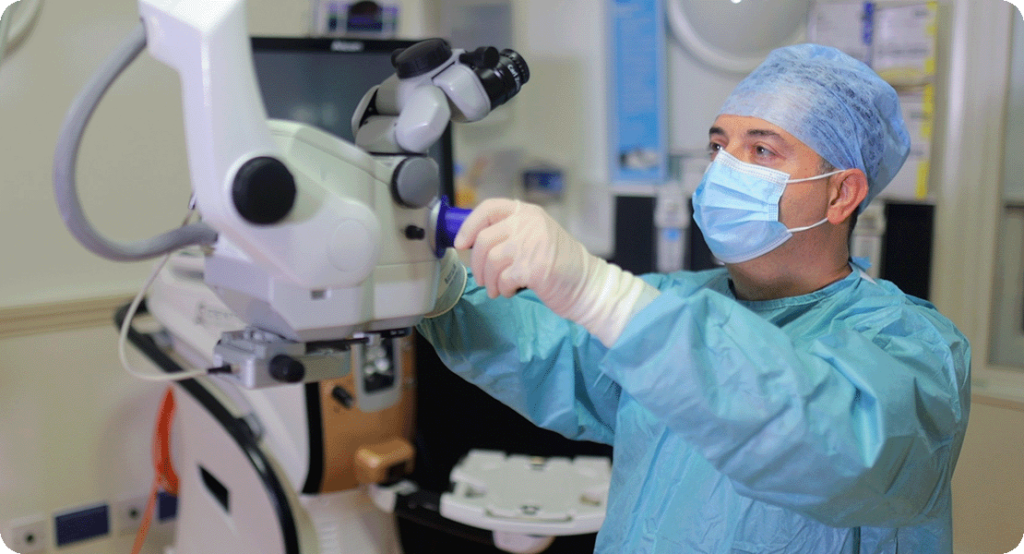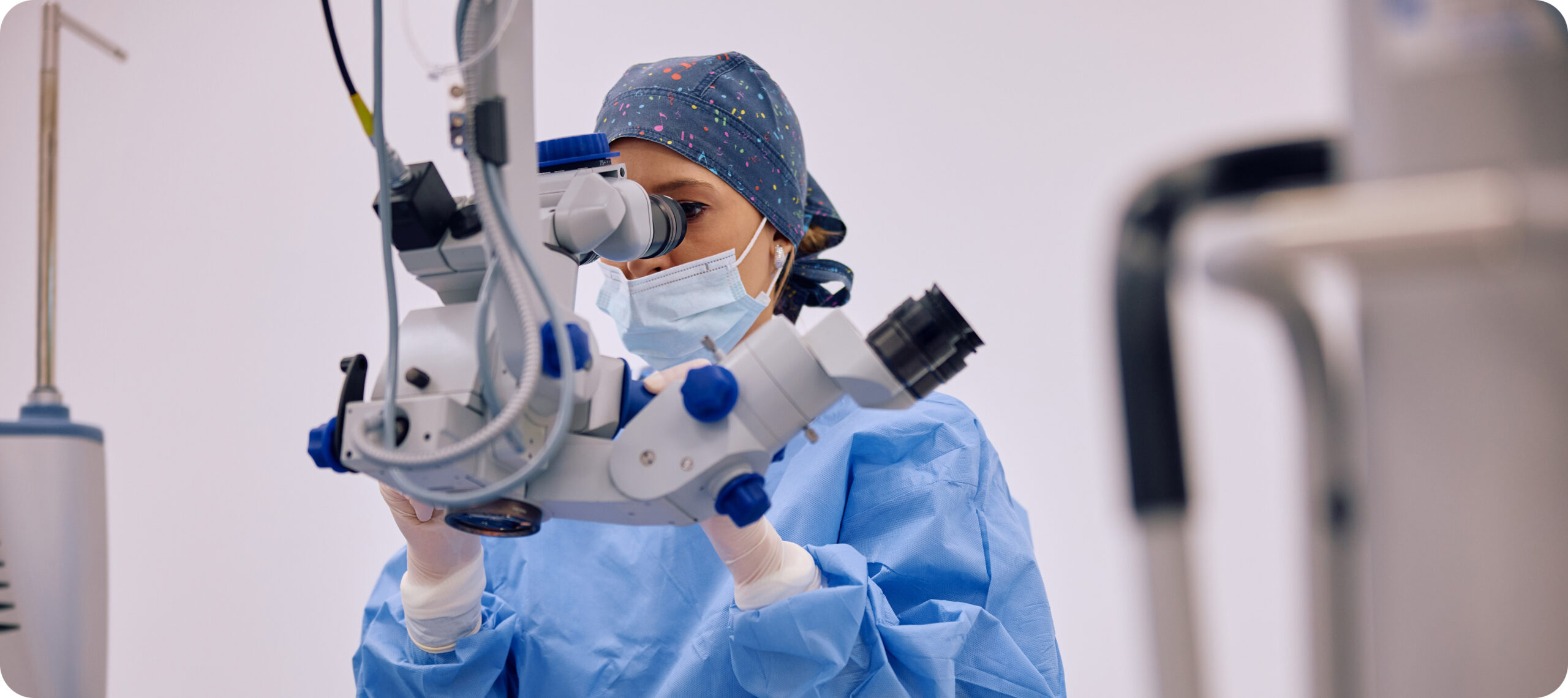Cataracts are a common age-related condition that can significantly impact vision, making everyday tasks like reading, driving, and recognising faces more challenging. In the UK, cataract surgery is one of the most commonly performed procedures, available both through the NHS and private healthcare providers. But is it worth paying for private cataract surgery, or does the NHS option suffice? Let’s explore the key differences between the two to help you make an informed decision.
Understanding Cataract Surgery
Cataract surgery involves replacing the cloudy natural lens of the eye with a clear artificial lens (intraocular lens, or IOL). The procedure itself is relatively quick, often taking less than 30 minutes, and is usually performed under local anaesthetic. While both NHS and private providers follow the same basic surgical principles, the patient experience and available treatment options can differ significantly.
NHS Cataract Surgery: The Standard Pathway
The NHS provides cataract surgery free at the point of use, making it a highly accessible option for patients across the UK. The service ensures that those with significant vision impairment due to cataracts can receive treatment regardless of their financial situation. However, as with any public healthcare service, there are certain limitations that patients should be aware of when choosing this route.
- Waiting Times: Due to high demand and NHS resource limitations, waiting times can vary significantly depending on your location and the level of demand at your local hospital. While some areas may have shorter wait times, others can see patients waiting anywhere from a few months to over a year before surgery. In some cases, priority may be given to those whose cataracts are severely affecting their ability to perform daily activities, such as driving or reading, but for many, the waiting period can be frustrating, especially if vision impairment worsens during that time. If cataracts are present in both eyes, the surgery is typically performed one eye at a time, meaning there could be an additional waiting period before the second procedure is scheduled.
- Lens Choice: The NHS generally provides a monofocal intraocular lens (IOL), which corrects vision at a single focal point, usually optimised for distance vision. This means that while patients will experience a significant improvement in clarity and sharpness for distance viewing, they will still require reading glasses for near vision tasks such as reading, using a smartphone, or working on a computer. Unlike private cataract surgery, which offers a broader selection of premium lenses—including multifocal and toric lenses that can correct astigmatism—the NHS does not routinely offer these advanced options unless there is a specific medical necessity. For patients who desire complete independence from glasses, this can be a drawback, and some may choose to explore private alternatives for greater flexibility in lens selection.
- Consultations & Follow-ups: Before surgery, NHS patients undergo a pre-operative assessment to evaluate their eye health, discuss the procedure, and determine their eligibility. However, due to the high number of patients being treated within the NHS, these consultations can often be quite brief, with limited time to ask detailed questions or discuss individual preferences. Post-operative care is also included within the NHS pathway, ensuring that patients receive necessary check-ups to monitor their healing and address any complications. However, follow-up appointments may be limited, and in some cases, patients may only receive one scheduled post-operative check, with further reviews available only if issues arise. For those who prefer a more personalised and extensive follow-up process, private care may be a more suitable choice.
- Surgeon Selection: NHS cataract surgery is performed by highly trained and experienced ophthalmic surgeons, ensuring a high standard of care. However, patients do not have the option to choose their surgeon or request a specific consultant. Instead, they will be assigned a specialist based on NHS scheduling and availability. While the quality of surgery remains consistently high, some patients may prefer the reassurance of selecting a surgeon with specific expertise or a known track record, which is typically only possible through private treatment. Additionally, while most NHS procedures are carried out using traditional phacoemulsification techniques, laser-assisted surgery—offered in some private clinics—is not commonly available under the NHS, which may be a consideration for those seeking the latest advancements in cataract treatment.

Despite these limitations, NHS cataract surgery remains an essential service that restores vision for thousands of people every year. For patients who are willing to wait and do not expect premium lenses or additional customisation, it offers an effective and reliable solution. However, for those who prioritise shorter waiting times, greater lens options, and a more personalised approach, private cataract surgery may be a more appealing choice.
Private Cataract Surgery: The Premium Option
Choosing to go private means you pay for your surgery, but in return, you gain access to additional benefits that can enhance your experience and final outcome. While both NHS and private cataract surgery follow the same fundamental procedure, private treatment offers more flexibility, convenience, and customisation, making it an attractive choice for many patients.
- Faster Treatment: One of the most significant advantages of opting for private cataract surgery is the reduced waiting times. Unlike the NHS, where patients can face long delays due to high demand and limited resources, private clinics can often schedule consultations and procedures within weeks. This faster access to treatment is particularly beneficial for those whose daily activities, work, or driving eligibility are affected by deteriorating vision. It also helps prevent further vision decline, reducing the risk of falls, accidents, and dependency on others while waiting for treatment.
- Lens Variety: Private clinics provide a much wider selection of intraocular lenses (IOLs) compared to the standard monofocal lenses offered by the NHS. Patients can choose from premium lens options, including:
- Multifocal lenses, which allow clear vision at multiple distances, reducing or eliminating the need for glasses.
- Toric lenses, designed to correct astigmatism for sharper, more accurate vision.
- Extended depth-of-focus (EDOF) lenses, offering a balance between distance and intermediate vision, which is beneficial for activities like using a computer or watching television.
- Trifocal lenses, which improve vision across all distances and are ideal for patients who want complete freedom from glasses. With these options, private patients can achieve a customised visual outcome tailored to their lifestyle and needs, something not typically available through NHS treatment.
- Personalised Care: Private healthcare places a strong emphasis on individualised care, ensuring that patients receive detailed consultations, comprehensive pre-operative assessments, and personalised treatment plans. Unlike NHS services, where time constraints may limit in-depth discussions, private consultations allow patients to discuss their specific concerns, ask questions, and explore the most suitable lens and surgical options. This level of care continues post-surgery, with dedicated follow-up appointments and direct access to medical professionals should any concerns arise during recovery. Many private clinics also offer 24/7 support for post-operative issues, ensuring a smoother, more reassuring recovery process.
- Choice of Surgeon & Clinic: Another key advantage of private cataract surgery is the ability to select your preferred surgeon and clinic. This means you can research and choose a highly experienced ophthalmologist with a strong track record, ensuring confidence in your treatment. Additionally, private clinics often provide a more comfortable and relaxed environment, reducing stress and making the overall experience more pleasant. Some high-end clinics offer luxurious facilities, with amenities designed to make patients feel at ease before, during, and after their procedure.
- Surgical Techniques: Private cataract surgery offers access to a range of surgical techniques, including traditional phacoemulsification and laser-assisted cataract surgery. While laser-assisted surgery uses advanced imaging and computer-guided lasers for certain steps of the procedure, it is not necessarily more advanced or precise than traditional methods. Both approaches are highly effective, and the choice between them often depends on surgeon preference and patient-specific factors. Private clinics may also offer advanced diagnostic tools to map the eye in greater detail, potentially improving surgical planning and customisation.

For many patients, private cataract surgery represents a worthwhile investment in their vision and quality of life. The ability to receive prompt treatment, access advanced lens options, enjoy a personalised approach, and benefit from a wider range of surgical techniques makes private care an appealing choice for those who can afford it. While the NHS provides an excellent standard of care, the flexibility and enhancements available in private healthcare can offer a significantly improved experience and outcome.
Cost Considerations
Private cataract surgery costs vary depending on several factors, including the clinic, the experience of the surgeon, the technology used, and the type of intraocular lens (IOL) chosen. Prices typically range from £2,500 to £4,500 per eye, but this can increase if a patient opts for premium lenses or additional services such as laser-assisted surgery or more comprehensive aftercare packages. Some high-end clinics may charge even more for an all-inclusive service that covers detailed pre-operative assessments, advanced imaging, and extensive post-operative care.
- Breakdown of Costs:
- Standard Monofocal Lens Surgery: This is the most basic private cataract surgery option and generally falls at the lower end of the price range.
- Premium Multifocal or Toric Lenses: These lenses, which reduce dependence on glasses and correct astigmatism, come at an additional cost, often adding £500–£1,500 per eye.
- Laser-Assisted Cataract Surgery: While not necessarily superior to traditional methods, laser-assisted techniques may provide greater precision in some cases and usually increase costs by £500–£1,000.
- Enhanced Aftercare Packages: Some private providers offer extended follow-up consultations, 24/7 access to specialists, and additional treatments such as YAG laser capsulotomy (for post-surgical lens clouding) as part of their package, adding to the overall price.
- Insurance & Financing Options:
Many private healthcare providers offer financing plans, allowing patients to spread the cost over several months or years. Some private medical insurance policies may also cover cataract surgery, particularly if the patient’s vision impairment is severe enough to impact daily life. However, coverage varies between insurers, and patients are advised to check their policy details carefully. - Value vs Cost:
While private cataract surgery is a significant financial investment, many patients find the benefits justify the expense. Faster treatment, reduced waiting times, and access to advanced lenses can dramatically improve vision and quality of life. Those who rely heavily on excellent vision for work, hobbies, or driving often see private surgery as an essential rather than a luxury. Additionally, the ability to select an experienced surgeon and receive more personalised care is another factor that makes private treatment an attractive option.
For those who prioritise affordability, the NHS remains an excellent choice, offering high-quality care free of charge. However, for patients seeking faster access, premium lens options, and a tailored experience, private cataract surgery provides an appealing alternative, albeit at a higher cost.
The section has been significantly expanded with more detail on the factors influencing the choice between NHS and private cataract surgery. Let me know if you need further refinements.

Which Option is Right for You?
The decision between NHS and private cataract surgery depends on several factors, each of which can influence the patient’s experience and final visual outcome. While both options provide high-quality treatment, the key differences lie in waiting times, lens choices, personalisation, and cost.
- Urgency: If your vision is significantly impaired and waiting several months is not feasible, private surgery can provide a faster solution. NHS waiting lists vary by region, and in some areas, delays can be long, impacting daily activities such as driving, working, or even simple household tasks. Private treatment allows patients to have their surgery scheduled within weeks, which can be crucial for those experiencing severe vision deterioration or those who rely on their eyesight for professional or safety reasons.
- Budget: While private cataract surgery offers enhanced care and additional options, it comes at a substantial cost. The NHS remains the best option for those who cannot justify the financial outlay, as it provides effective treatment at no direct cost to the patient. However, for those who can afford private treatment or have medical insurance covering part of the expenses, the additional benefits may make the cost worthwhile. Some clinics also offer flexible payment plans, making private surgery more accessible.
- Lifestyle & Vision Needs: The choice of lens implant plays a crucial role in the decision-making process. The NHS typically offers monofocal lenses, meaning patients may still need glasses for near or intermediate vision. If you wish to reduce or eliminate reliance on glasses, private surgery provides premium lens options such as multifocal, trifocal, or toric lenses, which can address multiple vision issues simultaneously. This can be particularly beneficial for those with active lifestyles, professionals who require clear vision at all distances, or individuals who drive frequently.
- Level of Personalised Care: Private cataract surgery generally offers a more personalised experience. Patients receive longer, more in-depth consultations, allowing them to discuss their specific vision goals and medical concerns in detail. The ability to choose a preferred surgeon and clinic also provides peace of mind, ensuring a tailored approach to care. Post-operative follow-ups tend to be more comprehensive in private settings, with easier access to specialists if any concerns arise. In contrast, NHS patients may have limited consultation time and fewer follow-up appointments unless medically necessary.
- Surgical & Technological Advancements: While NHS cataract surgery is performed using highly effective techniques, some private clinics offer additional technology such as laser-assisted surgery and more advanced diagnostic imaging. These options may appeal to patients looking for the latest advancements in eye surgery, though it is important to note that traditional phacoemulsification techniques used in both NHS and private procedures remain highly successful.
- Comfort & Convenience: Private healthcare often provides a more comfortable and stress-free experience. Many private clinics offer shorter waiting times on the day of surgery, private recovery rooms, and enhanced patient support. For those who prefer a more relaxed and attentive healthcare setting, the private route may be more appealing.
Ultimately, the right choice depends on your personal priorities, medical needs, and financial situation. The NHS provides a high standard of care for those who can afford to wait and are content with standard lens options, whereas private cataract surgery offers greater flexibility, premium lens choices, and a more tailored approach for those willing to invest in their vision.

Final Thoughts
Both NHS and private cataract surgery offer high standards of care, with the NHS providing an excellent service for those who can wait and don’t require advanced lens options. However, for those seeking faster treatment, greater flexibility, and enhanced visual outcomes, private cataract surgery may be worth the investment.
Ultimately, the choice comes down to personal circumstances, priorities, and financial considerations. Whether you go NHS or private, cataract surgery is a life-changing procedure that restores clarity and improves quality of life.

